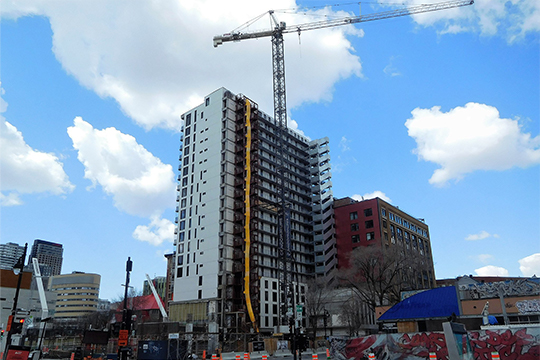
Is $2225 affordable rent in Greater Montreal? If the 54 ads placed by Canada Mortgage and Housing Corporation (CMHC) across the country in the 18 months leading up to the federal election are any indication, the answer is “yes”! The disconnect of the ruling class could not be more clear.
These ads offered low-interest, 50-year amortization loans to builders of rental apartments under the National Housing Co-Investment Fund (NHCIF). It is estimated that between March and the end of September 2021, NHCIF provided loans totaling $9.7 billion to finance the construction of 29,700 residential units.
But what was the quid pro quo for this financial windfall? Builders had to commit to renting the units built with these federal funds for at least 10 years and at “affordable” prices, i.e. at prices no higher than 30 per cent of the total median household income in the regions concerned by the construction projects thus financed. In the Greater Montreal area, the median household income is, according to the latest Statistics Canada estimates, $88,990 per year, hence the incredible affordability threshold of $2225 per month!
In what universe, one might ask, would such a rent be affordable for most households in Greater Montreal? And in what universe would apartments financed by CMHC loans and rented at an average of $1,500, such as those in the Birch Meadows housing complex in Moncton, N.B., be considered affordable in a city where the average rent last year was $880?
Apparently this is the case in the world of federal minister of Housing, Diversity and Inclusion Ahmed Hussen and Prime Minister Justin Trudeau. During the last election campaign, the Liberal Party promoted the NHCIF as a key lever to “build and renovate more affordable housing.” As one might well imagine, and as University of Toronto professor David Hulchanski explicitly noted in a Globe and Mail article, the housing policies pursued by the Liberal Party and the Trudeau government are simply “a public relations stunt.”
The situation does not get much better if we look at the world in which the Quebec government lives. Although he considers himself to be “very connected to reality,” Premier François Legault fiercely denies the very existence of a housing crisis in Quebec, supported by the minister responsible for Housing, Andrée Laforest. In response to a question from Québec solidaire co-spokesperson Manon Massé, Legault recently stated that the current price of housing in Montreal “starting at about $500 or $600 a month … could quite quickly rise to $1,000 a month.”
The leading candidates for mayor of Montreal are also lacking in their understanding of Quebec housing issues. While the cost of housing and access to property have risen to the top of the priorities of Montreal voters, Valérie Plante and Denis Coderre have responded to these concerns by engaging in a duel of proposals which, however, all go in the opposite direction of what needs to happen.
While the mayor promised to “expand the Residential Acquisition Support Program (RASP) to stimulate access to home ownership,” Coderre pledged to promote the construction of 50,000 additional units in the city over the next four years: “If we want to put downward pressure on prices and work on the affordability of the city,” he said, “we must build, we must increase the supply.”
It is therefore clear that the two mayoral candidates share, in essence, the same approach. This approach consists in believing that the solution to the housing crisis will come from the same “market forces” that have been fueling a speculative real estate bubble for years, or from public policies that are in line with the NHCIF loans. Such solutions are destined to prove ineffective for the simple reason that they do not address the real housing crisis that is hitting not only Quebec and Canada, but the entire world. There is a housing shortage, but not just any housing: what is missing is affordable housing!
As the latest figures from the Organisation for Economic Co-operation and Development (OECD) show, 42 million housing units, or nearly 10 per cent of the rental stock of the countries that belong to this same intergovernmental organization, are currently vacant. In Canada, the number of vacant dwellings is 1.34 million, or 8.7 per cent of all residential units. It can be estimated that if all these vacant homes were expropriated, the equivalent of “six years of housing supply at the average construction rate measured between 2016 and 2019” could be achieved.
These figures show, therefore, that the solution to this situation cannot be limited to building new homes or providing more incentives to builders and buyers. On the contrary, they point to the need to address the causes of both the high number of unoccupied homes and the rise in rent prices, i.e., the causes that have led to a speculative bubble in the real estate sector, which has been exacerbated by the pandemic. In other words, they show us how necessary it is to tackle the profits that are made every day off of the backs of tenants!
Faced with the housing crisis in Quebec, Canada and around the world, far more radical and ambitious solutions are needed. We need to ban evictions; nationalize parasitic landlords, speculators, and big real estate developers; and introduce a real cap on rents. Such measures are, however, almost impossible to implement in a society based on the exploitation of workers and governed by the very people who get rich from real estate. As Friedrich Engels wrote in 1872, “In such a society the housing shortage is no accident; it is a necessary institution and it can be abolished together with all its effects on health, etc., only if the whole social order from which it springs is fundamentally refashioned.” The same applies today. When it comes to the housing crisis, there is only one conclusion: no solution without revolution!

